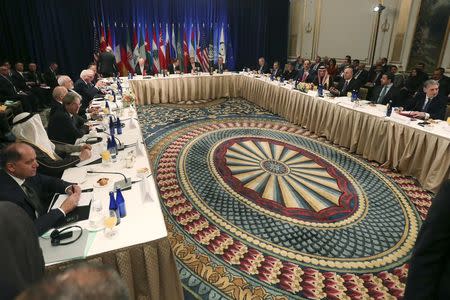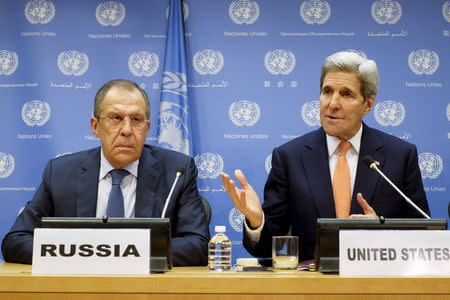U.N. council endorses Syria peace plan; no agreement on Assad's fate
By Arshad Mohammed, Denis Dyomkin and John Irish UNITED NATIONS (Reuters) - The United Nations Security Council on Friday unanimously agreed a resolution endorsing an international roadmap for a Syria peace process, a rare show of unity among major powers on a conflict that has claimed more than a quarter million lives. "This council is sending a clear message to all concerned that the time is now to stop the killing in Syria and lay the groundwork for a government that the long-suffering people of that battered land can support," U.S. Secretary of State John Kerry told the 15-nation council after the vote. The resolution came after Russia and the United States clinched a deal on a text. The two powers have had very different views on what should happen in Syria, where Islamic State militants control considerable territory that Western governments suspect has been a launch pad for attacks on Western nations and Russia. Kerry made clear that there were still differences on the future of Syrian President Bashar al-Assad, a close ally of Russia and Iran who Western countries want ousted. "We are under no illusions about the obstacles that exist. There obviously remain sharp differences within the international community, especially about the future of President Assad," Kerry added. Russian Foreign Minister Sergei Lavrov said about the resolution: "This is a clear response to attempts to impose a solution from the outside on Syrians on any issues, including those regarding its president." French Foreign Minister Laurent Fabius said the talks between the Syrian government and opposition would only succeed if there were credible guarantees on Assad's departure. There must be "guarantees on the departure of Bashar al-Assad," he said. "How could this man unite a people that he has in part massacred? The idea that he could once again stand for elections is unacceptable to us." The resolution does not touch on the question of Assad's fate. The text called for the U.N. to present the council with options for monitoring a ceasefire within one month of adoption of the resolution. It also backed a timeline previously agreed in Vienna for talks between the government on a unity government and opposition, and eventual elections. The talks between Syria's government and opposition should begin in early January, the resolution said. It also endorsed the continued battle to defeat Islamic State militants who have seized large swaths of both Syria and neighbouring Iraq. Agreement on a resolution came on the sidelines of a meeting of the so-called International Syria Support Group at New York's Palace Hotel. 'CHAMPIONS OF DEMOCRACY' During a break in Friday's talks, Jordanian Foreign Minister Nasser Judeh said he had presented a document compiling the groups each country attending considered to be a "terrorist" organisation. "Each country sent its own view. Some countries sent 15 to 20, others sent more," he told reporters. "It's a launch pad ... There will be follow-up steps to set the criteria (for which are to be labelled terrorist groups)." The roadmap, which also calls for a nationwide ceasefire that would not apply to Islamic State, Nusra Front and some other militant groups, was worked out in two rounds of ministerial talks in Vienna. Diplomats said the main problem in the negotiations on the resolution involved Russian and Iranian concerns about how to refer to a bloc of opposition groups that would join U.N.-led peace talks with the Syrian government set to begin in January. Western officials say a recent meeting in Saudi Arabia of opposition figures made significant headway in coming up with an opposition bloc, though Russia and Iran have questioned the legitimacy of the Saudi-hosted discussions. Foreign ministers from 17 countries, including Lavrov, Kerry and other European and Middle Eastern ministers, as well as top diplomats from regional rivals Turkey, Saudi Arabia and Iran, were in New York for the Syria meetings. In a dig at Saudi Arabia, Iranian Foreign Minister Mohammad Javad Zarif wrote in The Guardian on Friday it was "utterly absurd that those who have denied their own population the most rudimentary tenets of democracy ... are now self-declared champions of democracy in Syria." "Their democracy, however, is not to give Syrians a voice, but instead to thwart the political process by stonewalling a ceasefire, while pushing for self-proclaimed al Qaeda affiliates to have a prominent place at the negotiating table," he wrote. "Only ballots – not bullets – can ultimately usher in a new era in Syria." The Riyadh conference agreed to set up a 34-member secretariat to supervise peace talks, and that committee will also select the opposition's negotiating team. Diplomats said that at previous rounds of Syria talks in Vienna, Zarif and his Saudi counterpart engaged in several heated exchanges about Syria. Earlier this week diplomats said some progress had been made on the most difficult sticking point in the talks: Assad's fate. They said Russia had indicated it had no problem with the eventual ouster of Assad at the end of a transition period, though it would not admit that publicly. (Additional reporting by Louis Charbonneau, Parisa Hafezi, John Irish, Parisa Hafezi and Michelle Nichols; Writing by Louis Charbonneau and Michelle Nichols; Editing by Tom Brown and James Dalgleish)

 Yahoo News
Yahoo News 


